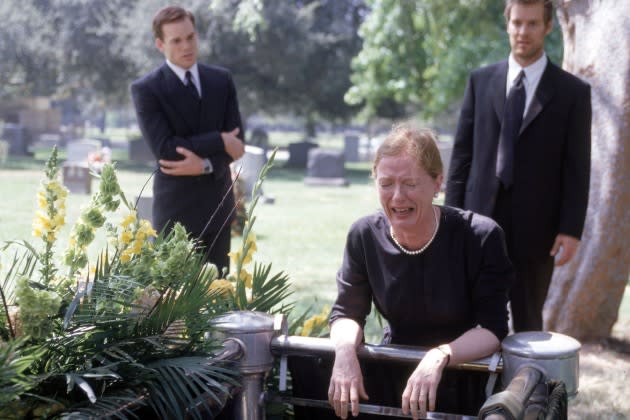Streaming Détente? As HBO Eyes Licensing Deal With Netflix, Industry Sees Opportunities

HBO’s potential deal to license a slew of library titles to rival Netflix, as revealed by Deadline, was met with derision by some, another example of Warner Bros. Discovery boss David Zaslav selling off the crown jewels to hit his savings targets.
However, industry experts have urged that the move could actually open the door to streaming profitability and increase residuals for creatives, leading to a larger digital détente.
More from Deadline
Talk of such a move was a surprise, largely given the frostiness between the two rivals, which have been battling it out on the talent and awards front for the last few years, but optics aside, a deal, which was described as “groundbreaking” by one source, could be good for consumers and the town.

In addition to Issa Rae’s Insecure, Deadline has confirmed that the non-exclusive deal, which has not been signed, will include Dwayne Johnson’s Ballers, war miniseries Band of Brothers and The Pacific and, most significantly, Six Feet Under. These titles were first reported by Vulture.
Until a few years ago, when the majority of the Hollywood studios launched their own streaming services, licensing arrangements like this were relatively common. Netflix acquired a lot of library content and it was a boon for the studios’ distribution arms.
HBO, itself, had an arrangement with Amazon, signed in 2014, that saw series such as The Sopranos, The Wire, Deadwood, Rome, Six Feet Under, Eastbound & Down, Enlightened and Flight of the Conchords, stream on its Prime Video service.
HBO’s premium cable rival Showtime also previously had a deal with Netflix, selling it titles such as Dexter and The Tudors, after their run on the linear network.
However, the launch of HBO Max, Disney+, Peacock, which famously took back The Office from Netflix, and to a lesser extent Paramount+, as well as smaller streamers such as AMC+ and Starz, meant that these companies put up walled gardens to house their own content.
There have been exceptions; last year, HBO struck a deal with Hulu for the rights to vampire drama series True Blood, which also streams on Max.
Non-exclusive deals allow a studio to make back some money on library titles, open up an opportunity for a new audience and also increase streaming residuals, a key facet of the WGA’s fight with the AMPTP, for creatives.
Given that Zaslav is trying to come up with up to $5B in cost savings following the merger between Warner Bros. and Discovery, in a week where around 100 executives were laid off at its cable networks group and it emerged that the company was selling half of its music publishing assets such as Purple Rain and The Last Waltz, a few extra dollars for older series that are likely little watched on Max, makes sense from a financial point of view, according to a number of industry experts.
But certain factions within HBO were understood to have been unhappy with the deal, which comes after the relaunch of Max, without its previous HBO-branded moniker. Warner Bros. Discovery “would sell the furniture if they could”, one source told Deadline.
Having said that, it could have been far worse for those hoping to keep the HBO brand as a Tiffany brand if Zaslav’s team had started shopping the rights to recent gold-standard titles such as Game of Thrones or Succession.
Ten years ago, Netflix co-CEO Ted Sarandos famously said that its “goal is to become HBO faster than HBO can become us”. However, Netflix itself has largely pivoted to a new strategy, one that is no longer just about rivaling HBO to land critically acclaimed prestige dramas, but about broadening out its range with recent originals such as The Diplomat and The Night Agent.
Warner Bros. Discovery is also not the only studio mulling this option. Disney is also looking to reverse course from its own walled garden, eyeing opportunities outside the Mouse House.
In April, CEO Bob Iger said that “on occasion” it will consider licensing some titles to rivals.
“In order to achieve the goal of getting into the streaming business very successfully, we felt we had to take control back of the content that we had licensed to third parties. At that point, most of it was going to Netflix and we actually enjoyed a good relationship with them over the time when we licensed content to them. But we licensed very valuable content, content that we felt we absolutely needed,” he said.
But as with HBO, don’t expect The Mandalorian or Loki to land on Netflix any time soon. “We’re not looking to license our core Marvel, Disney, Pixar or Star Wars product to third parties. We will consider on occasion licensing other product to third parties,” he added.
Ted Hope, who was co-head of movies at Amazon Studios between 2018 and 2020, said this week that the streamers all “adopted the wrong group think”. “All the streamers killed, or generally injured, theatrical runs, non-exclusive media sequencing, & territorial licensing. Will all the streamers now return to The Old Wisdom?,” he added. “It did work and it made [money].”
As the great streaming correction highlighted, money talks.
Best of Deadline
TV Cancellations Photo Gallery: Series Ending In 2023 & Beyond
2023 Premiere Dates For New & Returning Series On Broadcast, Cable & Streaming
Sign up for Deadline's Newsletter. For the latest news, follow us on Facebook, Twitter, and Instagram.

